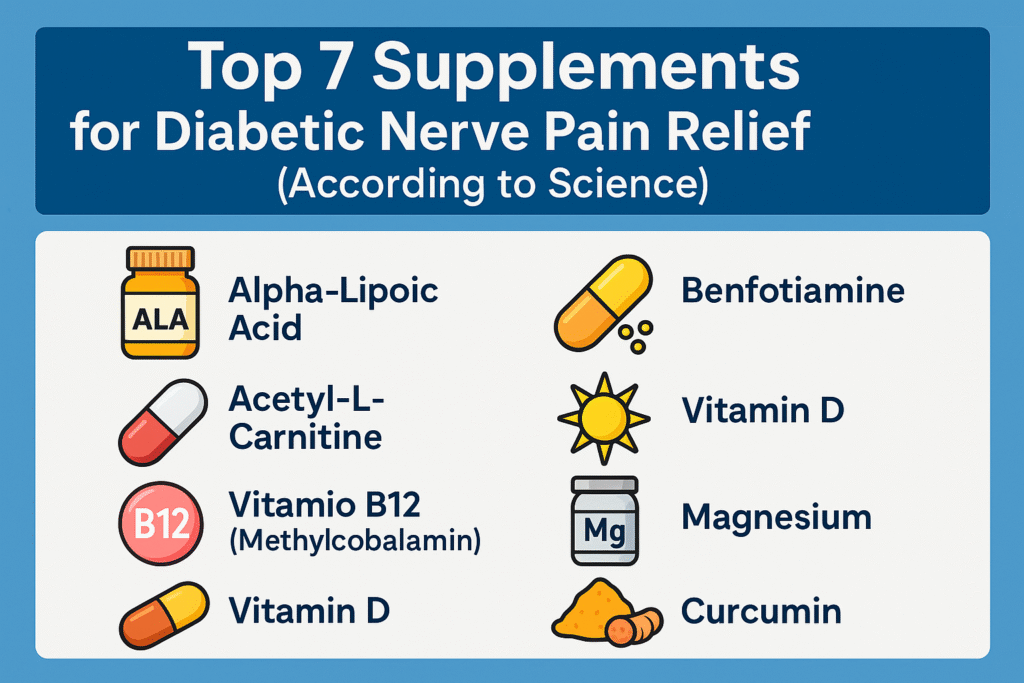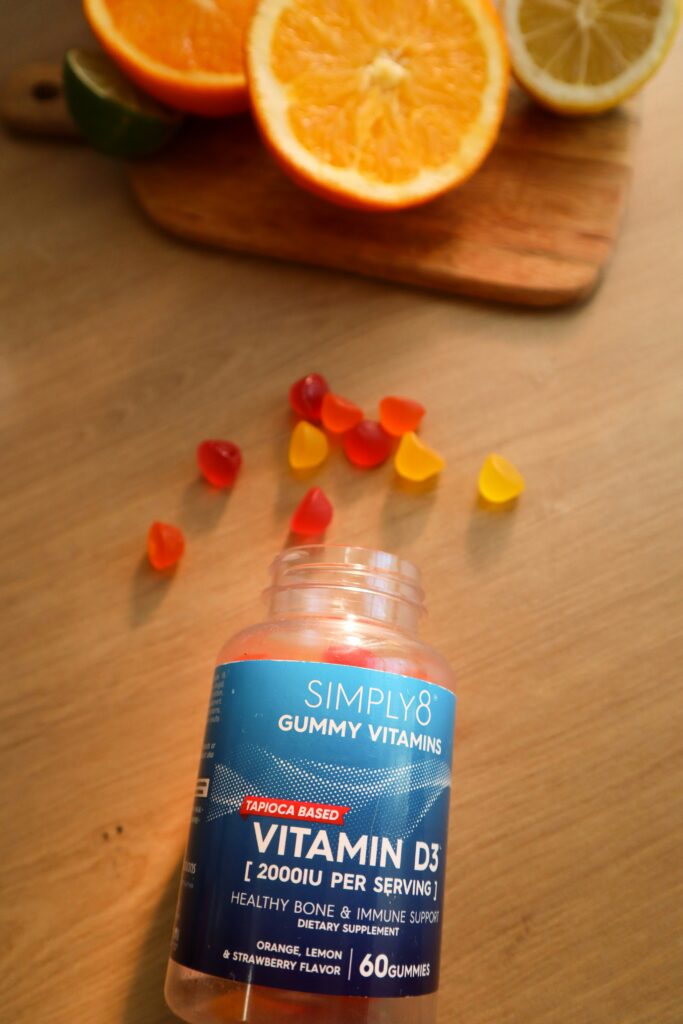
⚠️ Affiliate Disclaimer: This post may contain affiliate links, which means I may earn a small commission — at no extra cost to you — if you make a purchase through one of these links. I only recommend products or services I genuinely trust and believe can provide value. Thank you for supporting My Medical Muse!
Top 7 Supplements for Diabetic Nerve Pain Relief (Backed by Science)
Looking for relief from diabetic nerve pain? Discover the top 7 science-backed supplements for diabetic neuropathy that can reduce tingling, burning, and numbness naturally.
Table of Contents:
- 1. What Is Diabetic Neuropathy?
- 2. Why Supplements Matter in Nerve Pain
- 3. 7 Best Supplements for Diabetic Nerve Pain Relief
- 4. How to Choose the Right Supplement
- 5. Final Thoughts
What Is Diabetic Neuropathy?
If you’ve been living with diabetes for a while, you might already be familiar with that weird burning, tingling, or numb feeling in your feet or hands, that’s diabetic neuropathy, a type of nerve damage that affects more than half of all people with diabetes over time.
High blood sugar slowly damages the small blood vessels that supply your nerves, leading to uncomfortable symptoms such as:
- Burning or stabbing pain
- Tingling or “pins and needles” sensations
- Numbness
- Muscle weakness
- Poor balance
- Increased risk of foot injuries or ulcers
What makes it worse is that there’s no one-size-fits-all cure, and many people don’t respond well to pain medications. That’s where supplements come in.
Also Read: Everything You Need To Know About Diabetic Neuropathy
Why Supplements Matter in Nerve Pain
Most diabetic neuropathy treatments focus on pain control, but supplements go a step further by addressing the underlying nutritional deficiencies, oxidative stress, and inflammation that contribute to nerve damage.
Scientific studies have shown that certain vitamins, minerals, and natural compounds can:
- Support nerve repair.
- Improve blood flow.
- Reduce inflammation.
- Decrease pain and tingling.
Let’s explore the top 7 supplements that have shown promise in relieving diabetic nerve pain based on actual science.
7 Best Supplements for Diabetic Nerve Pain Relief
Alpha-Lipoic Acid (ALA):
The antioxidant powerhouse, alpha-lipoic acid is a powerful antioxidant that works both in water and fat environments. It’s one of the most well-studied supplements for diabetic nerve pain.
It helps by reducing oxidative stress in nerves, improving blood flow to nerves, enhancing insulin sensitivity, reducing burning, tingling, and pain.
A 2012 meta-analysis published in Diabetes Care found that 600 mg/day of ALA significantly improved neuropathy symptoms after just 3 weeks of use.
Recommended Dosage:
600-1200 mg per day (typically in divided doses)
ALA can lower blood sugar, so talk to your doctor if you’re on medication.
Acetyl-L-Carnitine (ALC)
For nerve regeneration, Acetyl-L-carnitine is an amino acid that helps produce energy in your cells and supports nerve regeneration. Benefits include, promotes nerve fiber repair, reduces pain and numbness, boosts energy levels and mood (especially in elderly diabetics).
A 2005 study in Diabetes Care showed that patients taking 500-1000 mg of ALC twice daily had significant pain relief and nerve fiber regeneration.
Recommended Dosage: 1000-2000 mg per day
May cause mild nausea or restlessness in some users.
Vitamin B12 (Methylcobalamin):
For numbness and nerve damage, Vitamin B12 is crucial for healthy nerve function. Diabetics especially those taking metformin are often deficient in B12, which can worsen neuropathy. Benefits include supports myelin sheath regeneration (protective nerve covering), improves numbness and balance, reduces tingling and shooting pain.
A 2005 study in the Journal of Diabetes and its Complications found that methylcobalamin, the active form of B12, significantly improved nerve conduction and reduced pain in diabetic patients.
Recommended Dosage: 1000 mcg daily or 1-2 injections per week (consult a doctor.
Make sure to use the methylcobalamin form not cyanocobalamin for better absorption.
Benfotiamine (Vitamin B1):
The anti-nerve-damage vitamin, Benfotiamine is a fat-soluble form of vitamin B1 that penetrates cell membranes more efficiently. Benefits include protects nerves from high blood sugar damage, improves nerve conduction speed, reduces inflammation and pain.
A 2008 German study published in Experimental and Clinical Endocrinology & Diabetes showed that benfotiamine improved nerve function and reduced pain within 6 weeks in patients with diabetic neuropathy.
Recommended Dosage: 300-600 mg per day
Well-tolerated, but not recommended during pregnancy without medical advice.
Vitamin D:
The sunshine hormone, Vitamin D isn’t just for bones, it also plays a role in nerve repair and immune modulation. Benefits include reduces neuropathic pain, lowers inflammation, supports insulin sensitivity.
A 2012 study in Pain Medicine found that correcting vitamin D deficiency led to significant pain relief in diabetics with peripheral neuropathy.
Recommended Dosage: 2000-5000 IU/day (based on blood levels)
Always check blood levels before supplementing long-term. High doses can be toxic.
Magnesium
The anti-inflammatory mineral.
Magnesium is involved in over 300 enzymatic reactions, including those linked to nerve function. Benefits include reduced inflammation, improves nerve signal transmission, eases muscle cramps and pain.
Magnesium deficiency is common in diabetics and can worsen nerve pain. Studies suggest that correcting deficiency may help with neuropathy symptoms, although more large-scale trials are needed.
Recommended Dosage: 300-400 mg/day (preferably magnesium glycinate or citrate).
Too much magnesium can cause diarrhea or upset stomach. Start low and increase slowly.
Curcumin (from Turmeric):
The natural anti-inflammatory ingredient, curcumin, the active ingredient in turmeric, has potent anti-inflammatory and neuroprotective properties. Benefits include reduces nerve inflammation, blocks pain signaling pathways, improves circulation to damaged nerves.
A 2014 study in Phytotherapy Research showed that curcumin supplements helped reduce neuropathic pain and oxidative stress in diabetic rats. Human trials are now showing similar results.
Recommended Dosage: 500-1000 mg per day (standardized to 95% curcuminoids and ideally combined with black pepper for absorption)
Avoid high doses if you have gallstones or are on blood thinners.
How to Choose the Right Supplement
Not all supplements are created equal. Here’s what to look for:
- Third-party tested for purity and potency
- Clinically effective dosages (avoid underdosed products)
- No artificial additives or fillers.
- Prefer active or bioavailable forms (e.g., methylcobalamin instead of cyanocobalamin)
You don’t need to take all 7 at once. Start with 2-3 based on your symptoms:
- Burning or tingling: Try ALA and B12
- Numbness or slow healing: Try ALC and benfotiamine
- Pain and inflammation: Consider curcumin and magnesium
Final Thoughts
Diabetic nerve pain is more than just annoying it can be life-altering. While medication may offer short-term relief, targeted supplementation gives your body the building blocks it needs to heal and protect nerves.
These 7 supplements backed by science can offer real, lasting relief when used consistently and wisely. Pair them with good blood sugar control, regular movement, and a nutrient-rich diet for best results.
As always, consult your healthcare provider before starting any new supplement especially if you’re on medication or managing chronic illness.
👩⚕️ Need Personalized Health Advice?
Get expert guidance tailored to your unique health concerns through MuseCare Consult. Our licensed doctors are here to help you understand your symptoms, medications, and lab results—confidentially and affordably.
👉 Book a MuseCare Consult NowRelated Posts:
- Can Vitamin B12 Injections Help with Tingling Feet?
- 7 Powerful Benefits of Turmeric for Neuropathy Relief
- Cold Feet from Neuropathy or Poor Circulation? How to Tell the Difference
- Can Chiropractor help with nerve pain in the feet?
- Diabetic Neuropathy Explained: 12 Brutal Reasons High Sugar Destroys Nerves
Dr. Ijasusi Bamidele, MBBS (Binzhou Medical University, China), is a medical doctor with 5 years of clinical experience and founder of MyMedicalMuse.com, a subsidiary of Delimann Limited. As a health content writer for audiences in the USA, Canada, and Europe, Dr. Ijasusi helps readers understand complex health conditions, recognize why they have certain symptoms, and apply practical lifestyle modifications to improve well-being


